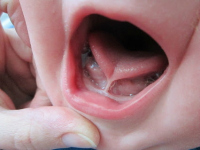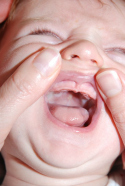Tongue Ties vs. Lip Ties
A tight lower tongue frenum attachment may restrict the mobility of the tongue and appears as a cupping or heart-shaped tongue when the tongue is elevated. This can result in the inability to get the tongue under the nipple to create a suction to draw out milk. Long term, a tongue tie can result in speech problems and/or issues later with transferring food around the mouth for chewing.
A tight upper lip frenum attachment may compromise full lip flanging and appear as a tight, tense, upper lip during nursing. This can result in a shallow latch during breastfeeding. Additionally, the tight upper lip may trap milk, resulting in constant contact of milk to the front teeth, and possibly lead to dental decay. If the frenum attaches close to the ridge or into a palate, a future diastema (gap between the teeth) can also occur.

Tongue Tie

Lip Tie
Symptoms of Tongue or Lip Ties
Some babies can have tongue or lip ties and not be symptomatic. To know if the ties are a problem, we ask two major questions: "Is the baby getting enough to eat?" and "Is nursing comfortable for the mother?"
Baby Symptoms
- Poor Latch
- Falls asleep while attempting to nurse
- Slides off the nipple when attempting to latch
- Colic Symptoms
- Reflux Symptoms
- Poor weight gain
- Gumming or chewing of your nipple
- Unable to hold a pacifier in his/her mouth
- Short sleep episodes requiring feedings every 1-2 hours
- Snore, breathe loudly or have sleep apnea
Mother Symptoms
- Creased, flattened, or blanched nipples after nursing
- Cracked, bruised, or blistered nipples
- Severe pain when your infant attempts to latch
- Poor or incomplete breast drainage
- Infected nipples or breasts
- Plugged ducts or mastitis
- Nipple thrush
Frenectomy Procedure
A frenectomy is a procedure used to correct a congenital condition when the lingual (tongue) or labial (lip) frenulum is tight, resulting in restriction of function. This may potentially result in the difficulty of breastfeeding and other concerns such as dental, digestive, and speech issues. If your lactation consultant or doctor feels that this procedure is warranted, then your baby may have a tongue and/or lip tie.
Babies tolerate the procedure very well, and we will try to ensure that discomfort is minimized.
It is common for babies to cry and/or act fussy during and after the procedure. Babies typically lose only a small amount of blood, if any at all. Once your baby is treated they are returned immediately to you. Please feel free to nurse, bottle-feed and cuddle your baby, depending on your preference.
If your baby does swallow a small amount of blood, he or she may have brown spit-ups or stool after the procedure.
Our State of the Art Lasers offer:
- Excellent hemostasis (risk of bleeding significantly reduced)
- Bactericidal effects (little chance of infection)
- Photobiomodulation effects (reduced inflammation and improved healing)
- NO need to place infant in the OR or under sedation
The laser is a much kinder method of revision, unlike electrosurgery, which actually burns the tissue, and the scalpel which cuts deeper than needed. There is little damage to adjacent tissue when using the laser, therefore healing is quicker and less post-operative discomfort occurs. In reality, the procedure is simpler and quicker than a filling, requiring no anesthesia or stitches!
Additional benefits include:
- Minimal to no bleeding allowing better visibility for the doctor
- Enhanced precision due to better visibility
- No need to inject epinephrine-based local anesthetic
- Complete removal of desired tissue
Tongue and Lip Tie Release FAQs
How do I know if my child needs a tongue or lip tie release?
If your child is having difficulties nursing, be sure to visit your family doctor or lactation consultant to make sure that the tongue or lip tie is the issue. Figuring out the cause of these issues and making a plan to remedy it benefits functions such as swallowing, chewing, digestion, and breathing for your child. Tongue or lip tie releases can be fixed at the Kneib Dentistry office. Contact us today!
When is the best time to get a lip or tongue tie removal procedure done?
Will my baby need an anesthetic or sedation during lip or tongue tie treatments?
What is the aftercare for a tongue or lip tie release?
Can my baby eat after having a lip or tongue tie release?

